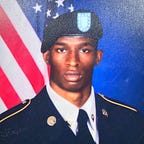Revisiting Michael Che Matters and the role of the comedian in black social commentary
In 2016 , Michael Che released his debut standup special, Michael Che Matters on Netflix.
The title of his hour special sets the tone for the viewer as he juxtaposes his name with the Black Lives Matter movement.
At that time in 2016 the movement was at its peak following major incidents : the Ferguson, Missouri unrest of 2014–2015 , the police shooting of 14 year-old Tamir Rice in 2014, and the mysterious death of Sandra Bland while in police custody.
And that’s just to name a few incidents in 2014–2015 alone.
In the standup, Che brilliantly provides social commentary of the treatment of black people as 3rd class citizens while hilariously highlighting the disparities between blacks and whites.
At the beginning of his routine, Che delivered the line, “blacks and cops aren’t getting along, I don’t know if you been reading the news for the past 400 years” in which the audience responded with laughter and thunderous applause.
As he went further into his routine, Michael Che compared the different communities in America who are fighting for “equal rights” while Black Americans are still fighting for “civil rights”, inferring that black people are still behind and still have a long way to go to be seen as equals to the white majority.
I did not find his remark as a joke, but rather as a poignant observation that describes his people as being no more than 3rd rate citizens. The more I replayed the quip, I began to ponder about what is the fundamental difference between equal rights and civil rights.
Based on the context of the premise and tonality of his voice, Michael Che used his creative license to play fast and loose with both definitions of the similar terms.
But let’s dissect his words.
When Michael Che positions civil rights as a level to get to before equal rights, the underlying point being made is that African Americans are still fighting for basic human rights.
But in American culture, civil rights is almost always implied as citizens who have the same rights as any other citizen.
But not in Che’s world.
Che deliberately implies in his premise that black people just want to be treated as “civil” in literal terms while the fight for having “equal” rights is in the far distant future in the white supremacist power structure.
The Civil Rights Act of 1964 was signed into effect by President Lyndon Johnson 57 years ago, largely due to the efforts of Dr. Martin Luther King and a coalition of black leaders throughout the country.
The landmark legislation outlaws discrimination based on race, color, religion, sex, and national origin. It prohibits unequal application of voter registration requirements, racial segregation in schools and public accommodations, and employment discrimination.
But not even legislation could ensure the basic human rights of black people could be protected. By 1964, Black Americans already endured the backlash of Reconstruction and the subsequent Jim Crow laws that followed for the next 100 years.
And even then black people became victims of the Southern Strategy, the 1980s crack epidemic, and the disproportionate incidents of police brutality towards black people. Most African American comedians I’ve watched over the years frequently lament these issues.
Black comedians such as Dick Gregory, whose own comedic career was overshadowed by his contributions to the Civil Rights Movement, inspired future generations of comedians to intersect race relations into their routines.
Gregory would often implement his interactions with racist white people in his standup with hilarious, and even sometimes to cartoonish effect.
But is it dangerous to joke about our trauma in front of mixed race audiences? How is it feasible that the descendants of our oppressors can laugh with us and not at us?
As audiences desegregated throughout the years, different cultures and ethnic groups became exposed to these conversations regarding the treatment of the black community.
As these diverse crowds grew comfortable to listen to these traumatic jokes, I often wonder if the nonblack audience feel empathy towards the plight of black people or is the comedy club their safe place to laugh at the biggest “open secret” that is black oppression?
The trauma of an entire race is often dressed up onstage as entertainment.
That’s the conundrum comedians such as Michael Che or a Dave Chappelle face: do they shed the tears of a clown for laughs or do they intend their words to inspire change in the viewers’ perspective about their views on black people?
With the right intention, it can be the latter.
The intent to educate while entertaining the viewer has been something comedian Dave Chappelle has done his entire career and Michael Che executes this masterfully. Their routines aren’t nigger jokes flying 100 miles per hour, but it’s thoughtful conversation in the guise of comedy.
The fight for our rights is a multiple front battle that can’t just rely on legislation, but rather hope that the ideas that spurred civil rights legislation catch on faster to the minds of the people. We can amend laws in favor of equal rights but they won’t mean much until minds and personal biases evolve to become more inclusive.
Our rights and the inability for them to be infringed upon go as far as our human decency takes us and comedians like Michael Che exemplify that brilliantly in their art. The comedy club is a microcosm of what America could be.
